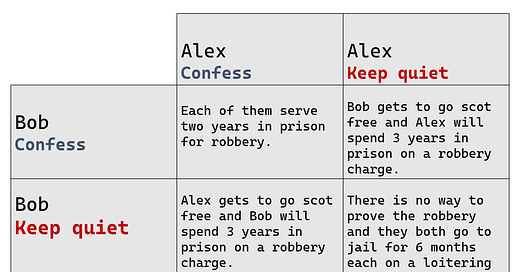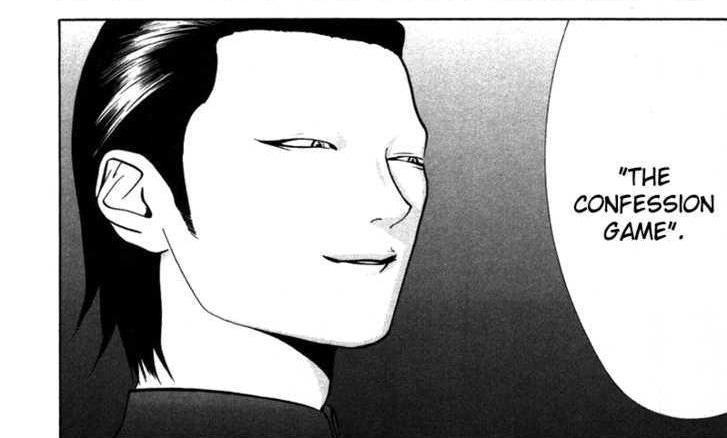The prisoner's dilemma of the Confession Game
Exploring Game Theory and Mechanism Design with "Liar Game"
Liar Game is a popular Japanese manga series that follows contestants who want to win a tournament, The Liar Game through trickery, lies, and cunning.
Contestants are each given 100 million yen and made to compete in a series of games to win the money of other players and losers are saddled with a 100 million yen debt.
One of the games played is the Confession game. In this Japanese adaptation of the classic Prisoner’s Dilemma, two players - Akagi and Shibayamasan are interrogated separately by their team lead, Yokoya to find who betrayed him.
Often referred to as a social trap, the Prisoner’s Dilemma is a game where two rational conflicting parties are pursuing their self-interest.
It is a classical example of game theory that illustrates why two rational individuals may not cooperate.
background
Imagine two robbers in a gang are arrested for trespassing on the premises of a supermarket. Each prisoner is kept in solitary confinement with no means of communicating with the other. But there’s a catch - the supermarket was robbed a while before the arrest and the police believe these guys did it. Let’s call them Alex and Bob. The problem is the police have no way to prove their suspicions and they must try to convince the robbers to admit to the robbery.
Each suspect can decide to:
betray their partner by testifying that the other committed the crime.
or cooperate with the other by remaining silent.
Their choices are represented in the matrix below.
prisoner’s dilemma decision matrix
To get the best outcome, the rational strategy is to confess.
If Bob confesses and Alex keeps quiet, Bob gets to go free and Alex will spend 3 years behind bars. If Bob confesses and Alex also confesses, they will both spend two years in prison for robbery. If however Bob chooses to keep quiet, and Alex confesses, Bob will spend 3 years in prison!!
Confessing is a better choice for each of them either way.
Confession game
In the Liar game tournament, some games are played in teams, like the Contraband game. The leader of one of the teams, Yokoya has a feeling the teammates Akagi and Shibayamasan have a connection with the opposing team, the South.
He proposes a game to ensure they confess - the confession game.
50 loyalty points and 200 million yen to whoever confesses first (which would put them above everyone else in the game) and also enough money to drop out of the game with enough money left over.
Whoever confesses later, or doesn’t confess loses 100 loyalty points.
If none of them confesses within ten minutes, both will be deemed innocent and will not be punished.
Akagi keeps quiet and Shibayamasan confesses.
confession game payoff matrix
final thoughts
Yokoya intended for the game to be a prisoner’s dilemma. However, both Akagi and Shibayamasan acted without putting their rational self-interests at heart.
Akagi didn’t rat Shibayamasan out because he considered him his partner.
Shibayamasan only confessed to get Yokoya off their trail since they were already in plans with the South.
want to feel the rush?
try playing a simulation of the confession game here.






The scenarios you gave made it easy to understand. I think I want to spend some spare time understanding in-depth how game theory and mechanism design works. 👍
Enjoyed your article. I wrote a similar one you might like to have a look at. https://medium.com/@Praxis/ethics-ain-t-no-game-oh-wait-yes-it-is-3862878d9194